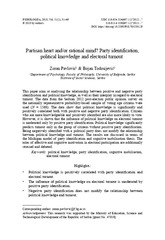Prikaz osnovnih podataka o dokumentu
Pristrasno srce i/ili racionalni um? - identifikacija sa strankom, političko znanje i izborna izlaznost
Partisan heart and/or rational mind?: Party identification, political knowledge and electoral turnout
| dc.creator | Pavlović, Zoran | |
| dc.creator | Todosijević, Bojan | |
| dc.date.accessioned | 2021-10-12T12:44:50Z | |
| dc.date.available | 2021-10-12T12:44:50Z | |
| dc.date.issued | 2018 | |
| dc.identifier.issn | 0048-5705 | |
| dc.identifier.uri | http://reff.f.bg.ac.rs/handle/123456789/2569 | |
| dc.description.abstract | Cilj ovog rada je analiza odnosa između pozitivne i negativne identifikacije sa strankom i političkog znanja, kao i njihovih međuodnosa u pogledu izborne izlaznosti. Korišćeni su podaci iz ispitivanja javnog mnjenja u Srbiji posle izbora 2012. na nacionalno reprezentativnom probabilističkom uzorku građana (N=1568). Podaci su pokazali da je političko znanje značajno i pozitivno povezano i sa pozitivnom i sa negativnom identifikacijom sa strankom. Veću verovatnoću da će glasati imaju građani koji imaju više političkog znanja i koji imaju pozitivnu identifikaciju sa strankom. Međutim, pokazalo se da uticaj političkog znanja na izbornu izlaznost moderira samo pozitivna identifikacija sa strankom. Političko znanje značajno predviđa izlaznost samo u grupi građana bez pozitivne identifikacije sa strankom. Negativna identifikacija sa strankom ne menja odnos političkog znanja i izlaznosti. Rezultati su razmatrani u terminima Mičigen modela identifikacije sa strankom i teze kognitivne mobilizacije. Uloge afektivne i kognitivne motivacije u izbornom učešću su dodatno naglašene i razmatrane. | sr |
| dc.description.abstract | This paper aims at analysing the relationship between positive and negative party identification and political knowledge, as well as their interplay in regard to electoral turnout. The data from the Serbian 2012 post-election public opinion survey on the nationally representative probability-based sample of voting age citizens were used (N = 1568). The data show that political knowledge is significantly and positively correlated both with positive and negative party identification. Citizens who are more knowledgeable and positively identified are also more likely to vote. However, it is shown that the influence of political knowledge on electoral turnout is moderated only by positive party identification. Political knowledge significantly predicts turnout only in the group of citizens without positive party identification. Being negatively identified with a political party does not modify the relationship between political knowledge and turnout. The results are discussed in terms of the Michigan model of party identification and cognitive mobilisation thesis. The roles of affective and cognitive motivation in electoral participation are additionally stressed and debated. | en |
| dc.publisher | Društvo psihologa Srbije, Beograd | |
| dc.relation | info:eu-repo/grantAgreement/MESTD/Integrated and Interdisciplinary Research (IIR or III)/47010/RS// | |
| dc.rights | openAccess | |
| dc.rights.uri | https://creativecommons.org/licenses/by-sa/4.0/ | |
| dc.source | Psihologija | |
| dc.subject | političko znanje | sr |
| dc.subject | kognitivna mobilizacija | sr |
| dc.subject | izborna izlaznost | sr |
| dc.subject | identifikacija sa strankom | sr |
| dc.subject | political knowledge | en |
| dc.subject | party identification | en |
| dc.subject | electoral turnout | en |
| dc.subject | cognitive mobilisation | en |
| dc.title | Pristrasno srce i/ili racionalni um? - identifikacija sa strankom, političko znanje i izborna izlaznost | sr |
| dc.title | Partisan heart and/or rational mind?: Party identification, political knowledge and electoral turnout | en |
| dc.type | article | |
| dc.rights.license | BY-SA | |
| dc.citation.epage | 49 | |
| dc.citation.issue | 1 | |
| dc.citation.other | 51(1): 31-49 | |
| dc.citation.rank | M23 | |
| dc.citation.spage | 31 | |
| dc.citation.volume | 51 | |
| dc.identifier.doi | 10.2298/PSI170322011P | |
| dc.identifier.fulltext | http://reff.f.bg.ac.rs/bitstream/id/1284/2566.pdf | |
| dc.identifier.scopus | 2-s2.0-85044776868 | |
| dc.identifier.wos | 000428566400003 | |
| dc.type.version | publishedVersion |

